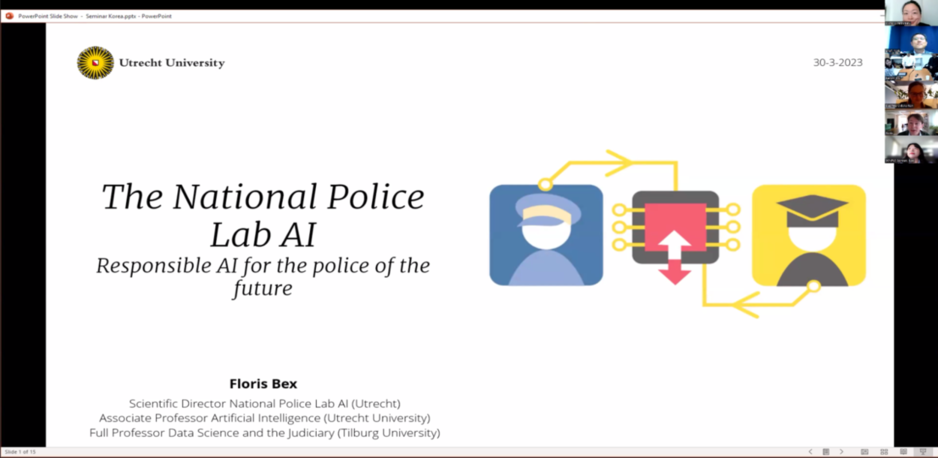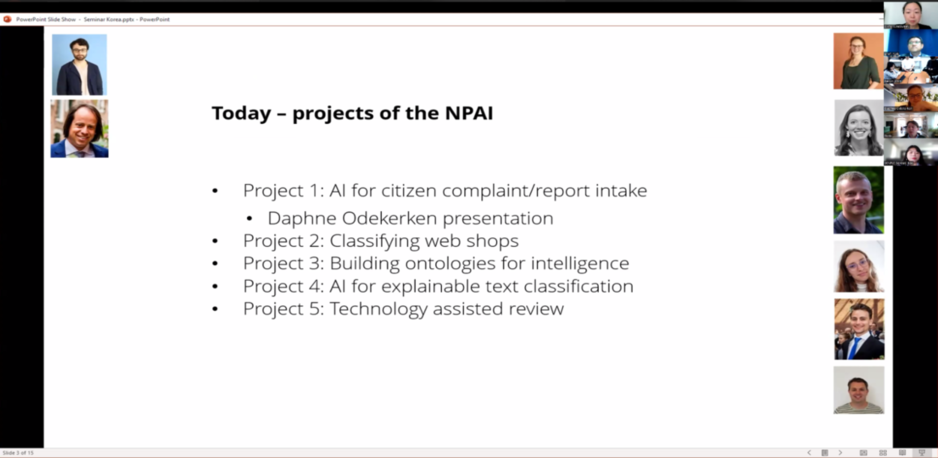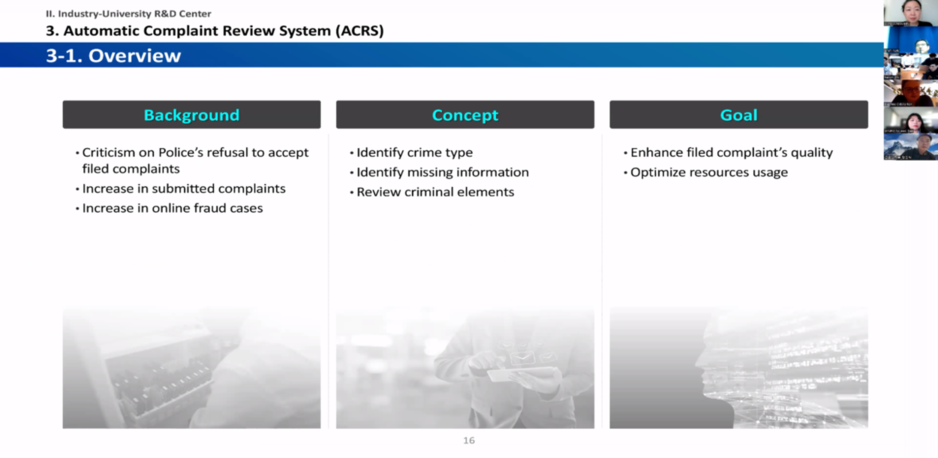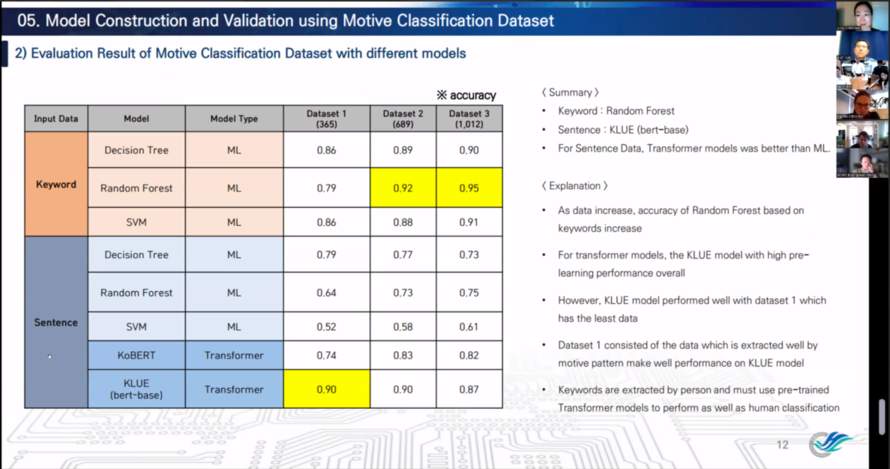On March 30th, an online joint seminar was held between Legal Informatics and Forensics Science (LIFS) lab of Hallym University, Korean National Police Universtity, HM Company, and National Police AI lab of Utrecht University.
This seminar was held in collaboration with Professor Floris Bex and AI-Researcher Daphne Odekerken from the National Police AI lab of Utrecht University. The purpose of this meeting was to introduce and exchange research progress and future plans among the research labs and institutions.
The purpose of this meeting was to facilitate the sharing and exchange of research progress and future works among various research labs and institutions that share similar research objectives. By coming together in this seminar, our aim was to discuss the current trends and advancements in our respective fields of study, with the intention of contribution to research. The collaborative environment provided an opportunity to foster innovation, gain insights from each other’s work, and explore potential avenues for collaboration and synergy. Through these discussions, we aimed to collectively advance the state of research and contribute to the broader scientific community.
The start of the seminar began with Hallym University’s brief presentation of the past and ongoing research projects. The main focus was about the current “AI Based Crime Investigation Support System”, introducing key technologies of the LIFS Hallym lab, such as the generation of argument structure schema, establishment of an investigation report writing support system, development of event structure analysis visualization program, semantic case (argument structure) recommendation, and the alternative hypothesis search along with the recommendation technology.
In addition to the previously mentioned research, Professor Floris Bex and AI Researcher Daphne Odekerken from the National Police AI lab at Utrecht University have introduced several studies they have conducted with the following additional topics.


AI system for citizen complaint/report intake The system analyzes complaints and provides recommendations on whether or not to file an official report, considering factors such as fraud or criminal activity. Their study showed that 40 to 60 percent of citizens followed the system’s recommendations.
Classifying webshops using AI Examination of features such as addresses, bank accounts, and logos to determine whether the webshop is legitimate or potentially malicious. They also incorporate external APIs, such as the Chamber of Commerce API, for verification.
Building ontologies for intelligence Knowledge graphs are utilized to simulate scenarios where certain factors are missing and making informed decisions based on reasoning capabilities.
Furthermore, their research delves into AI for explainable text classification and technology system review, particularly in the context of law enforcement. They employ AI to process various text data sources and aim to generate explanations that make sense to humans, enhancing understanding of crime incidents and underlying factors. Lastly, they utilize active learning for relevant document retrieval, where the system presents documents to humans one by one for relevance determination, improving its ability to identify relevant documents more effectively than random selection methods.
HMC presented a project that aligns with Prof. Bex’s research, the Automatic Complain Review System(ACRS). The ACRS focuses on enhancing complaint quality and optimizing resource usage. The project aims to address concerns such as the police’s refusal to accept filed complaints, the surge in submitted complaints, and the rise in online fraud cases. By identifying crime types, addressing missing information, and reviewing criminal elements, the project seeks to improve the overall quality of complaints while efficiently utilizing available resources.
To achieve this task, their key elements are to devlelop a knowledge and datset base, automate extraction and visualization of data, and also provide public safety information.

Korean National Police University gave a breif description of the Public Data Science Research Center, which focus on crime data science and social network analysis. Their goals include talent development, big data analysis support, and leading research. They collaborate with institutions like the Korean National Policy Agency, conduct research in various fields, and organize conferences. The research lab has a primary objective of establishing a thriving data science ecosystem. They seek to create an environment where researchers and practitioners from various universities can collaborate, exchange ideas, and contribute to the advancement of data science.
Last but not least, Ph.D candidates from Hallym University Yeri-Gu and Ari-Choi has presented the ongoing research from their master’s thesis paper.
Yeri’s research project is focused on the development of an automated system for extracting argument structures in the context of crime analysis. The main objectives include creating a reliable annotated corpus specifically tailored for crime analysis, utilizing BERT-based models, a type of transformer-based model, for accurate identification of argument components and detection of argument relations, and visualizing the extracted argument structures in the form of graphs. By leveraging transformer-based models, the project aims to improve the understanding of internal structures in legal court decisions for enhanced comprehension of legal judgments. Additionally, future work involves exploring the incorporation of knowledge graphs to provide deeper insights into the reasoning process behind the extracted argument structures.
Ari focused on improving judgment search by utilizing motive-based similarity analysis. The research examined the similar case function in Korean LegalTech, specifically focusing on Lbox, a LegalTech company in Korea that offers judgment-related services. The study employed WMD, GloVe, and KoBERT models to identify similar cases, but human analysis was needed to resolve discrepancies. The research emphasized the importance of specific criteria, particularly the motive behind the crime, in determining similar case matching. Motives were categorized into fundamental motives and motivations, and four main motive patterns were identified. Classification models, including random forest and the KLUE bert-base model, were used to classify keywords and sentence data. The study achieved promising results and aims to further explore and enhance the process of searching for similar cases.

During the seminar, participants had the opportunity to directly learn about each other’s research and engage in question-and-answer sessions, which facilitated more efficient research progress. Their valuable contributions and expertise greatly enhanced the discussions, providing valuable perspectives and enriching the overall seminar experience. We sincerely appreciate their contributions and look forward to further expanding my research perspectives through seminars and discussions.


